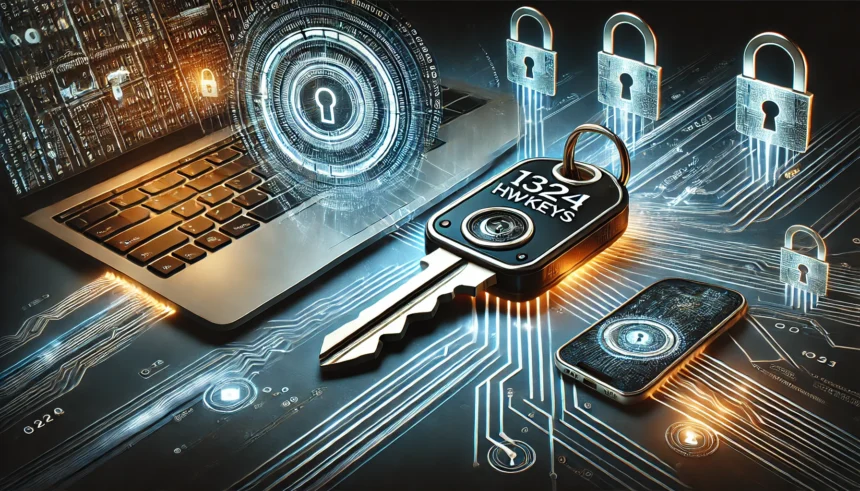Introduction to 1324HWKeys
Unlocking doors has never been more intriguing! If you’ve stumbled upon the term “1324HWKeys,” you’re not alone. These keys represent a fascinating blend of tradition and innovation in the world of security. As technology advances, so do our methods for ensuring safety and access control. From mechanical keys that have stood the test of time to cutting-edge smart keys that fit seamlessly into our digital lives, 1324HWKeys encompass it all.
In this guide, we’ll explore everything you need to know about 1324HWKeys: their history, types, advantages and disadvantages, maintenance tips, troubleshooting common issues, and even some alternatives. Whether you’re a tech enthusiast or just curious about how these tools work in your everyday life, there’s something here for everyone. Let’s dive into the captivating world of 1324HWKeys!
History of 1324HWKeys and Its Purpose
The history of 1324HWKeys traces back to the evolution of security measures in various industries. Initially designed for traditional locks, these keys transformed significantly as technology advanced.
In response to increasing concerns about safety and unauthorized access, manufacturers began developing more sophisticated locking mechanisms. The introduction of mechanical keys marked a pivotal moment, offering enhanced durability and reliability.
As electronic systems emerged, so did electronic keys. These innovations added convenience and advanced features like remote access and programmable codes. The rise of smart keys further revolutionized the landscape, incorporating tech-savvy solutions that integrate seamlessly with modern devices.
Each iteration aimed to address specific needs in security while adapting to contemporary lifestyles. This ongoing evolution reflects society’s demand for better protection without compromising ease of use.
Different Types of 1324HWKeys
When it comes to 1324HWKeys, diversity is key. Different types of keys serve various needs and preferences.
Mechanical keys are the classic choice. These sturdy options provide tactile feedback that many users appreciate. They’re often preferred for traditional locking mechanisms.
Next up are electronic keys. These utilize advanced technology to offer enhanced security features. With a simple push or swipe, they unlock doors without the hassle of digging for a physical key.
Then there are smart keys, pushing innovation even further. Integrated with mobile apps or RFID technology, these modern marvels allow remote access control and monitoring—an ideal fit for tech-savvy individuals.
Each type has its unique benefits and drawbacks depending on your lifestyle and security requirements. Understanding these differences helps you make an informed decision tailored to your needs.
A. Mechanical Keys
Mechanical keys are the traditional form of key technology. They have been around for centuries, embodying simplicity and reliability.
Made from metal, these keys operate through a series of pins inside the lock mechanism. When you insert a mechanical key, it aligns with those pins to unlock your door or secure an item.
Their design is straightforward. You turn the key in the lock, which engages the internal components. This process remains unchanged despite advances in technology.
One significant advantage is their durability. Mechanical keys can withstand wear and tear over time. There’s little that can go wrong compared to more complex systems.
However, they do come with challenges too. Losing a mechanical key often means calling a locksmith for replacement or rekeying locks altogether.
Despite modern alternatives available today, many still appreciate this classic option for its ease of use and reliability.
B. Electronic Keys
Electronic keys have transformed the way we think about security and access control. Unlike traditional mechanical keys, these devices use electronic mechanisms to grant entry. This innovation simplifies user experience while enhancing safety.
Typically, electronic keys come in various forms such as key fobs or proximity cards. They communicate with a locking mechanism via radio frequency identification (RFID) technology. With just a tap or swipe, users can unlock doors without fumbling for metal keys.
One significant advantage is their programmability. Administrators can easily add or revoke access levels for different users through software systems. This flexibility makes them ideal for businesses that require strict access control measures.
Additionally, many electronic keys offer advanced features like audit trails and remote monitoring capabilities. These functions provide valuable insights into who accessed areas at specific times—ideal for enhancing security protocols in both residential and commercial settings.
C. Smart Keys
Smart keys are revolutionizing the way we access our vehicles and homes. These innovative devices use advanced technology, often incorporating Bluetooth or RFID systems, to provide seamless entry.
With a smart key, you can unlock your car with just a touch or even by proximity. This convenience eliminates fumbling for traditional keys when your hands are full.
Additionally, many smart keys come equipped with features like remote start and personalized settings for driver preferences. That means each time you enter your vehicle, it’s already tailored to your liking.
Security is another significant advantage of smart keys. They generally offer enhanced encryption methods that make unauthorized access much more difficult compared to standard mechanical keys.
However, it’s essential to keep in mind that these sophisticated gadgets rely on batteries and electronic components. Regular maintenance and timely battery replacements ensure uninterrupted functionality.
Pros and Cons of Using 1324HWKeys
Using 1324HWKeys comes with its share of advantages and drawbacks.
On the positive side, these keys enhance security significantly. Their unique design makes unauthorized duplication difficult, ensuring that access remains exclusive to the rightful owner.
Convenience is another major factor. With options like smart keys, users can unlock their doors or start their vehicles without fumbling for a traditional key. This seamless experience often saves time in daily routines.
However, there are downsides to consider. Mechanical failure can occur with electronic and smart keys, leading to frustration when you least expect it. Additionally, battery dependence in some types means regular maintenance is crucial to avoid unexpected lockouts.
Cost is another concern; advanced key systems tend to be pricier than standard mechanical ones. Weighing these pros and cons will help inform your decision on whether 1324HWKeys are right for your needs.
How to Use and Maintain 1324HWKeys
Using 1324HWKeys effectively starts with familiarity. Understand how each key functions in your specific application. Whether you’re working with mechanical, electronic, or smart keys, knowing their unique features enhances usability.
Maintenance is vital for longevity. Regularly inspect mechanical keys for wear and tear. For electronic keys, keep the battery charged and ensure software updates are applied promptly.
Smart keys require a different approach. Always store them away from magnets or extreme temperatures to prevent malfunction. Clean the surfaces gently to avoid dust accumulation that could hinder performance.
When not in use, consider designated storage areas to minimize loss or damage. This practice not only protects your investment but also keeps everything organized and accessible when needed.
If issues arise during usage, refer back to manufacturer guidelines for troubleshooting tips tailored specifically for your type of 1324HWKey.
Troubleshooting Common Issues with 1324HWKeys
When using 1324HWKeys, you might encounter some common issues. One frequent problem is a key not working. This can often be traced back to dirt or debris in the key slot. A simple cleaning with compressed air may solve this.
Another issue could be battery-related for electronic and smart keys. If your key isn’t responding, replacing the battery is worth trying first. Always keep spare batteries handy.
If your smart key fails to connect with your vehicle, ensure that it’s within range and there are no obstructions nearby. Sometimes, simply reprogramming the device resolves connectivity problems.
If you experience repeated lockouts, check for updates on firmware or software related to digital keys. Keeping everything up-to-date helps maintain smooth operations of your 1324HWKeys system without hiccups.
Alternatives to 1324HWKeys
When exploring alternatives to 1324HWKeys, several options come into play. One popular choice is traditional key systems. These mechanical locks rely on physical keys that can be easily duplicated but may lack advanced security features.
Another alternative lies in electronic locking mechanisms. These often utilize keypad entry or card access systems, offering convenience and ease of use. They’re particularly effective in commercial settings where frequent access changes are common.
Smart locks represent a modern solution as well. Integrating with smartphone apps, these devices allow users to control access remotely and monitor activity through their mobile devices.
Biometric systems provide an extra layer of security using fingerprint or facial recognition technology. While generally more expensive upfront, they offer robust protection against unauthorized entry.
Each option comes with its own set of benefits and drawbacks tailored to specific needs and preferences.
Conclusion
1324HWKeys represent a blend of tradition and innovation. Their versatility makes them valuable in various settings, from homes to offices.
Understanding the different types helps users select the right option for their needs. Whether you prefer mechanical, electronic, or smart keys, each has unique features that cater to specific requirements.
Maintenance is crucial. Regular checks can prevent issues down the line and ensure smooth operation.
As technology evolves, so do alternatives to traditional key systems. Exploring these options might provide even more convenience and security.
The landscape of locking mechanisms continues to shift rapidly. Staying informed about advancements ensures you make educated choices regarding your security solutions.
Embracing new trends while respecting proven methods creates balance in securing spaces effectively.
FAQs
Q: What are 1324HWKeys?
A: 1324HWKeys refer to a specific type of key system used across various applications, ranging from mechanical locks to advanced electronic systems. They serve the essential purpose of securing access and ensuring safety.
Q: How do I know which type of 1324HWKey is right for my needs?
A: Choosing the right type depends on your specific requirements. Mechanical keys are straightforward but can be less secure than their electronic or smart counterparts. Electronic keys offer enhanced security features, while smart keys provide convenience through connectivity options.
Q: Can I replace my old 1324HWKey with a new one?
A: Yes, in most cases you can replace an old key with a new one as long as it matches the locking mechanism. It’s advisable to consult with a professional locksmith for guidance during this process.
Q: Are there any maintenance tips for keeping my 1324HWKeys in good condition?
A: Regularly inspect your keys for wear and tear. For mechanical keys, keep them clean and avoid exposing them to moisture. For electronic and smart keys, ensure that batteries are replaced when needed and maintain software updates if applicable.
Q: What should I do if my 1324HWKey stops working suddenly?
A: First, check the battery (if it’s an electronic or smart key) or look for damage on mechanical versions. If troubleshooting doesn’t work, consult your user manual or contact customer support for assistance tailored to your specific issue.
Q: How secure are 1324HWKeys compared to other types of locking mechanisms?
A: Security varies depending on the type of key system you choose. Generally speaking, smart locks tend to offer higher security due to encryption technology compared to traditional mechanical ones; however, all systems have vulnerabilities that need consideration based on individual use cases.






